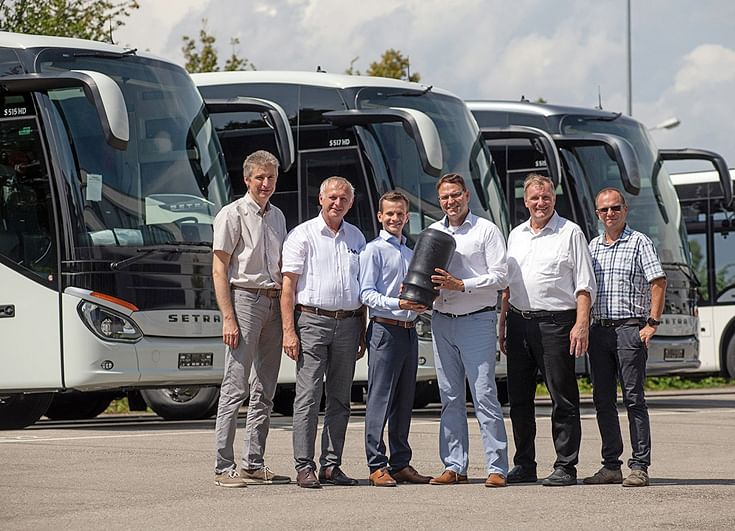Continental's latest air springs look to reduce CV weight by 15kg
Supplier claims that use of integrated plastics and polyamide piston in the suspension components will save weight without compromising on ride comfort.
German Tier 1 major Continental has unveiled its latest technological breakthrough - a lightweight air spring - which it claims can reduce kerb weight in a commercial vehicle by up to 15 kilograms.
The air spring system features an integrated plastic roller piston technology that harbours significant benefits in weight reduction while also effectively lowering fuel consumption, CO2 emissions as well as ensuring good ride comfort.
The company says that the roller pistons ensure outstanding ride comfort owing to the maximum utilisation of the inner air volume and their special design. Instead of steel or aluminium, plastic components made from polyamide are used in the construction of the spring system which help to reduce weight without compromising ride quality.
Continental also believes that with increasing legal requirements for pollutant emissions, growing demand for electric vehicles and hybrids as well as the desire for enhanced ride comfort and optimised vehicle dynamics, all these factors are pushing the industry to deliver new lightweight innovations.
According to Diethelm Bauch, head - Air Spring Systems - Continental Commercial Vehicles Original Equipment segment, “We are facing some tremendous challenges in the automotive industry, with business models and markets undergoing major and rapid upheaval. Lightweight designs can make a key contribution, especially when it comes to energy efficiency and CO2 emissions."
"I see no end to this trend. Our lightweight air springs have in one fell swoop given bus and commercial vehicle manufacturers a solution that offers much greater design flexibility. Plastic offers much greater design freedom and the capacity for customised, comfort-oriented design," he added.

The development team: Stefan Fock, Manfred Aust (both EvoBus), Peter Heberle, Eckard Neitzel (both ContiTech), Thomas Klein, Dr. Jörg Schmitt (both EvoBus).
Daimler subsidiary EvoBus using lightweight comfort air springs
Continental says that bus maker EvoBus, which is a subsidiary of Daimler, has recognised these benefits and is now installing the lightweight comfort air springs in its buses, which operate all over the world. With this technology, Continental claims it is a pioneer in lightweight construction and the first company ever to use comfort pistons made from polyamide.
According to Continental, in addition to the reduced weight, good ride comfort for the passengers and high reliability of the air springs, it was above all the material expertise that prompted the Daimler Group's bus company to make Continental their partner of choice.
The Continental solution is also helping the company to meet the requirements of the EU’s Euro 6 emissions standard which makes provisions for substantial reductions in pollutant levels for trucks and buses and has been mandatory for newly registered commercial vehicles since 2014. The extra weight added by increasingly complex exhaust gas aftertreatment systems can be effectively offset by using such lightweight components.
“Our air springs have been used in trucks since 2011, and we have mass-produced around one million products to date,” says Eckard Neitzel, head, Air Spring Product Development, Continental Commercial Vehicles Original Equipment segment.
“We have extensive knowledge of what makes a component design highly resilient in the field and can use our own test benches to verify that the products are fit for purpose. This means that we can offer pre-tested products, which greatly reduces the validation work to be performed by the customer and so ensures that the product can be introduced quickly and with minimal risk," he added.
15kg shelved in each bus
The new lightweight air spring is designed for use in urban buses and coaches and generates weight savings of between 2 and 2.6 kilograms in each air spring module (depending on the axle type of the bus). “This means that the air springs can partially offset the additional weight of the Euro 6 emission clean-up system,” said Neitzel.
"Compared with traditional steel pistons, lightweight air springs can reduce the weight of a two-axle urban bus by up to 15 kilograms," he added.
The combination of injection moulding and a powerful, reliable joining process means that the inner volume of the piston can be utilised to its fullest, resulting in outstanding ride comfort. The lightweight air springs show high corrosion-resistance and durability as well while offering the same level of robustness and comfort akin the traditional spring systems fitted with steel pistons.
RELATED ARTICLES
Autoliv Plans JV for Advanced Safety Electronics With China’s HSAE
The new joint venture, which is to be located strategically near Shanghai and close to several existing Autoliv sites in...
JLR to Restart Production Over a Month After September Hacking
Manufacturing operations at the Tata Group-owned British luxury car and SUV manufacturer were shut down following a cybe...
BYD UK Sales Jump 880% in September to 11,271 units
Sales record sets the UK apart as the largest international market for BYD outside of China for the first time. The Seal...






 By Autocar Professional Bureau
By Autocar Professional Bureau
 04 Oct 2019
04 Oct 2019
 10329 Views
10329 Views








 Ajit Dalvi
Ajit Dalvi




